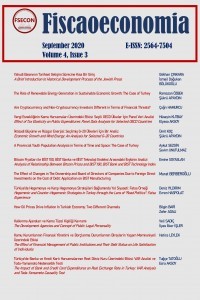
Fiscaoeconomia
Yazarlar: İsmail CANÖZ
Konular:İşletme
DOI:10.25295/fsecon.366622
Anahtar Kelimeler:Behavioral Finance,Investor Sentiment,Consumer Confidence Index,Toda-Yamamoto CausaliyTest
Özet: Traditional finance theories ignore investors’ sensitivity and psychology, assuming that they are rational. This situation leads to emergence of behavioral finance theories. The purpose of this study is to analyze the relationship between the Consumer Confidence Indices announced for Turkey and the Istanbul Stock Exchange Index. Within this scope, the monthly data from 2004 to 2017 have been analyzed using the Toda-Yamamoto Causality Test, which will be used for the first time in this subject. According to the analysis result, it is determined that there is a one-way causality relation from stock returns to consumer confidence. As a result, consumers’ confidence for the economy is affected by fluctuations in stock exchanges.